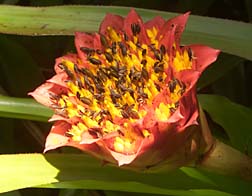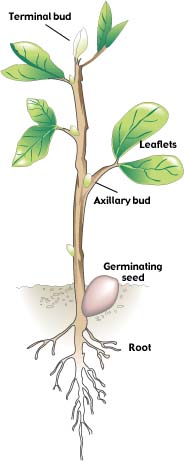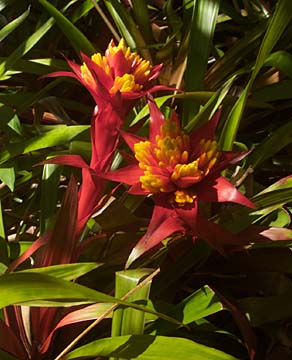


In The Garden![]()
Friday, August 17, 2001

GEORGE F. LEE / GLEE@STARBULLETIN.COM
Retired University of Hawaii Botany Professor Douglas Friend
stands in his Manoa Backyard amidst the
Portea bromeliad petropolitana.
YOU'D THINK retired botany professor Douglas Friend's advanced science degree and years of research have ensured him nothing but success in the garden. Especially if you see his cacti laden with stunningly beautiful burgundy flowers that look like smaller versions of night-blooming cereus. Friendly science
of gardeningGarden expert Douglas Friend
has successes and admits
to failuresBut he'll tell you different. He is as familiar with failures as he is with successes. Like any gardener, he is at the mercy of hungry slugs and birds, and a sometimes uncooperating Mother Nature.
Besides, he says, "scientists are poor gardeners. They mess around too much."
Friend isn't one to brag about his own beautiful garden, an 11,000-square-foot property landscaped with mature trees and flowering bromeliads. He says he's too much of an "untidy gardener" to have the perfect garden.

But he'll admit that an understanding of the science of plants does help.
Where: Lyon Arboretum BASIC BOTANY
FOR GARDENERS
When: Two-session course, 9 to 11 a.m. tomorrow and next Saturday
Cost: $32; $26 to arboretum members
Call: 988-0471
Friend will be sharing his knowledge in a two-session basic botany class at Lyon Arboretum beginning tomorrow. Walk-ins will be accepted tomorrow, but it's best to phone today to register. Call 988-0471.
The class is an introductory course linking science to the garden, Friend said. He'll cover topics such as: What plants are, how they grow, what they need to grow, how plants reproduce, plant adaptations in special conditions and plant families.
It is not a course on the mechanics of growing plants. He won't be talking about how to grow orchids, or the details of starting plants from cuttings. Instead, he'll discuss the biology of plants to help gardeners understand plant structures and needs, all of which can determine success or failure in the garden.

"Good gardening practices are based on a basic understanding of the fundamentals of plant biology, structure and growth. If you understand how a plant works, you understand why you have to keep it watered, fertilized and how to care for it to keep it growing," Friend said.Take watering for example. Friend won't be giving instructions on how much or when to water plants, but he'll explain why plants need water.
Plants need water because they are 95 percent water, Friend said.
The water needs to be replenished regularly because plants lose water as they take in the carbon dioxide in the air to make oxygen.

"Plants have little openings that open and shut. They have to open to let the air in the leaves, and they lose water that way. If they lose too much water, you'll have a dry plant and it's not going to grow," Friend said.If plants get too much water, they die also. Plants need respiration, and when the soil becomes flooded, the plants drown, Friend said.
Plants used to have fewer requirements. The first plants on earth were algae, and being surrounded by water, watering was not a problem, he said.
Those early plants were crucial to evolution, he said. They produced oxygen which helped create the ozone which cooled the earth to make it more hospitable to animals and plants.
"The early plants had tremendous consequences. If it weren't for them, we wouldn't have the air we breathe and the foods we eat, and the earth would be too hot. Plants provide the basis for all life," Friend said.
Friend, who retired from the University of Hawaii five years ago, specialized in the study of the effects of light on plants. Friend grew up in the London area, earning his doctorate degree from Imperial College. He was an agriculture researcher for the Canadian government before moving to Hawaii in 1966 to teach at the university, which operates the arboretum.
Gardening Calendar
Suzanne Tswei's gardening column runs Saturdays in Today.
You can write her at the Star-Bulletin,
500 Ala Moana, Suite 7-210, Honolulu, HI, 96813
or email stswei@starbulletin.com